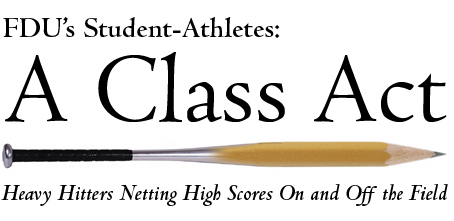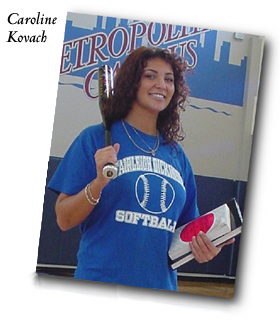


They notch goals aplenty, loft swish after swish, belt in
runs galore, while leading the Knights and Devils to wins, crowns and
championships. But their eyes never stray from the scores that really matter:
the marks in the classroom. FDU’s Division I and Division III student-athletes
compete hard in the athletic arena but their true victories occur in the classroom.
College at Florham
Division III Athletics Director Bill Klika gives a short
list of the qualities needed to succeed as a college student-athlete: “A
commitment to excellence, striving to be the best at what you do, discipline
and accountability.” While the list is not very long it also is not quite so
simple. Few high school students make the transition to college without any
problems. Add into the equation participation in a full-time sport and you have
the ingredients for a massive overload.

At the University’s College at Florham, however, stellar
performances by student-athletes — in their sports and in their studies — are the
norm. In fact, according to a yearly study by USA Today, in 2002, which
measures student-athletes’ graduation rates compared to the general student
body, the College at Florham was ranked sixth in the nation among all Division
III schools. And the students participating in intercollegiate athletics had an
average a grade point ratio (GPR) between 2.90 and 3.00.
Three members of the 2003 graduating class in particular
epitomize the successful student-athlete. Last year, the James Griffo Academic
Award (named for the campus’s first provost), presented to the senior male and
female athletes with the highest GPRs, was awarded to Michael Biancella and
Katie Kuperus.
Biancella, a linebacker on the football team, had 111
tackles — including l6 for losses — and three sacks in his first three years
with the Devils. Although a senior last year, he had another year of
eligibility and was on the Devils’ roster this fall while a graduate student.
His best season was 200l, when he totaled 69 tackles, including 11 that went
for losses.
Biancella hits the books as hard as opposing players. He has
a 3.60 GPR, and participated in the University Honors Program. He also has made
the Dean’s List eight times, was selected the Marketing Student of the Year for
2002–03, and was named to the Academic All-Middle Atlantic Conference (MAC)
team.
He credits his success to his work ethic. He says, “In order
to succeed on a football field, you must dedicate yourself to being the best.
It’s the same thing with the classroom: if you’re not dedicated to your work
you won’t excel.”
The Devils volleyball team set an all-time record for
victories in a season last year (22) and earned its first trip to the Eastern
College Athletic Conference (ECAC) playoffs. The leader of this winning group
was Katie Kuperus, who has been honored repeatedly for both her academic and
athletic accomplishments. Kuperus was the captain of the squad and led the team
with 97 total blocks to go along with the second-best hitting percentage at
.279.
Her grades soared just as high. Kuperus earned an impressive
3.88 GPR; was named to the MAC All Academic Team in 2000, 200l and 2002; and
has been on the FDU Honor Roll eight times. She says, “Coordinating academics
and athletics took a lot of time and hard work, but mostly the determination to
be the best.”
That same determination well characterizes Ed Cracchiolo,
who graduated last year with several school football records. He became the
all-time leading rusher with 3,456 yards, which also left him in third place
all-time in the MAC. He is the only Devil to rush twice for 1,000 yards. His 30
career rushing touchdowns are the most in school history, and he finished his
career with 204 points, also an FDU record. Last year Cracchiolo earned the
Robert T. Shields Award as FDU’s top male athlete.
His record-breaking exploits weren’t limited to the
gridiron. He was in the running for MAC Scholar Athlete in his senior year, and
was one of 10 finalists for the John Gagliardi Award, which is given out
annually to the nation’s outstanding Division III football player who succeeds
on the field, in the classroom, on campus and in the community.
Cracchiolo says a successful student athlete must “be determined not to be just average but to be the best. You must be complete both on and off the field.”
— J.A.
Metropolitan Campus
Division I Athletics Director David Langford is proud of his
teams’ sporting accomplishments: they have combined for 52 conference
championships throughout the years, a record six Northeast Conference (NEC)
Commissioner’s Cups and several NCAA Tournament appearances. What he is most
proud of, though, is the success of the athletes in the classroom.
“Our student-athletes are very competitive academically,”
says Langford. “They are diligent in attending class, they’re paying attention,
and they’re taking their academics seriously.”
The numbers speak for themselves. Last year alone, the Knights
had 46 student-athletes named to the NEC Honor Roll, and during the last six
years seven student-athletes were honored as NEC Scholar Athletes in their
respective sports for excellence on the playing field and with the books.

“I think that not only do the athletes here take pride in
athletics, but they take pride in their education,” says Caroline Kovach, a
senior outfielder on the softball team who is a two-time Verizon Academic
All-America District 2 selection. “They want to do well on the field as well as
off the field.”
In a recent NCAA study, Fairleigh Dickinson’s
student-athletes graduated at a rate l0 percentage points higher than the
general student population. Langford also boasts of their collective grade
point ratio (GPR), which was 2.99 last semester, also higher than that of the
general population.
“The percentages compare favorably with the University and
are consistent with national norms,” says Langford. “We’re pleased that our
environment encourages student-athletes to be in a position to graduate by
providing support through the Student-Athlete Support Services program,
Provost’s Office and Advising Center.”
The Student-Athlete Support Services program was instituted
four years ago on the Metropolitan Campus. A comprehensive system, designed to
advise, track and monitor the academic progress of student-athletes throughout
the year, serves as a communication network providing feedback from the faculty
to the department, coaches and student-athletes.
“We’re fortunate to have three full-time academic advisers,”
says Langford. “Jennifer Quirk and her two assistants, Pete Gaglioti and Stacey
Recanati, work well to help our student-athletes understand what is expected of
them and help them reach their goals. The entire staff does a phenomenal job.”
“Academic support services are very important to the success
of the athletes,” Kovach says. “The staff makes sure you’re on top of your work, and they are aware of what needs to be
done. Jen, Pete and Stacey are all very helpful.”
Since taking over as director of the program in 2002, Quirk
has helped motivate Fairleigh Dickinson’s student-athletes. She created the
Alpha Beta program, designed to honor students above a 3.00 semester GPR, and
has entered Fairleigh Dickinson into the National Collegiate Honor Society,
which honors junior and senior student-athletes with a 3.40 grade point average
or higher.
“We want to honor our student-athletes who are doing well,”
says Quirk. “We had 92 students achieve a 3.00 during that first semester for
Alpha Beta honors and 11 had a 3.40 or higher.”
“Our faculty are very supportive, and that is key,” Quirk
says. “I also think we recruit good student-athletes, not just athletes. They
are competitive in nature and take pride in what they do in the classroom. The
combination makes a successful program.”
Progress reports are submitted for all students to track any
academic problems and make sure they are on pace to complete their degrees. If
any issues exist, help such as tutoring is available.
For student-athletes in particular, time management is often
a challenge. The normal academic routine is skewed by practice for two or three
hours a day, injury treatments and travel time. “They have difficult objectives
to accomplish: doing well in their sport as well as in the classroom,” says
Quirk. “But it will help them down the road; time management is a key in life.”
Because of the juggling act student-athletes face, support
services can play a valuable role. “We help them concentrate on what’s
important,” says Quirk. “Our top priority is to have student-athletes enjoy
their college experience and do well academically.”
— D.B./S.N.
FDU Magazine Home | Table of Contents | FDU Home | Alumni Home | Comments